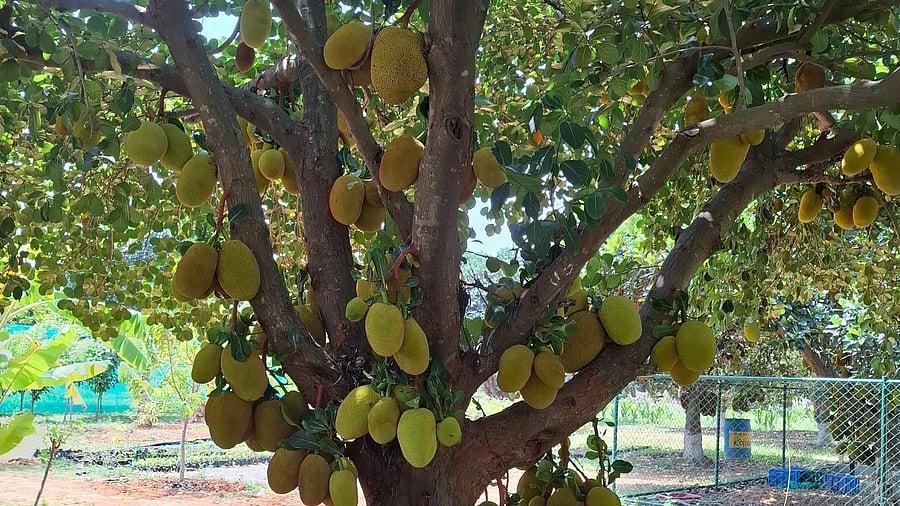
Credit: Special Arrangement
Step past the gates of the Horticulture College campus in Kolar’s Tamaka village, and you are greeted by towering jackfruit trees, heavy with fruit, standing like sentinels on either side. This is not just a campus; it is a living, breathing festival of jackfruit. Located just 10 km from Kolar city, this Horticulture College campus is home to the state’s first-ever Jackfruit Progeny Orchard.
Spread across 46 acres are over 1,600 jackfruit trees, each tagged and catalogued with a unique number. The shape, size, and surface characteristics of the jackfruits vary from tree to tree, and plaques display detailed information about each variety.
Some trees have fruit growing in clusters right at the base, while others stretch skyward with fruit clinging from trunk to tip. There are varieties with minimal gum and even trees that bear fruit year-round.
This thriving orchard owes its existence to M H Marigowda, hailed as the ‘Father of Horticulture’ in Karnataka. His dream took root in 1969, during Mahatma Gandhi’s birth centenary celebrations, when he proposed to develop 100 fruit farms across the state. The Tamaka jackfruit orchard was one of them.
“Due to delays in land acquisition, planting officially began in 1973,” recalls S V Hittalmani, a retired horticulture officer who proudly remembers Marigowda’s dream. “Most of the trees you see today were planted between 1973 and 1975,” he adds.
For about three-and-a-half decades (until 2008), the department officials nurtured the farm meticulously.
In 2009, a Horticulture College affiliated with the University of Horticultural Sciences, Bagalkot began functioning on the premises in Tamaka, and the farm, which was under the Horticulture Department’s care, was handed over to the university.
Since then, the farm has transformed into a centre for species conservation and scientific varietal development. “We have planted other fruit species only in open patches, mainly for educational demonstrations for students and farmers. The rest of the campus remains dedicated to jackfruit,” explains Raghavendra Mesta, dean at the Horticulture College.
A dream turns into reality
“Marigowda had envisioned this orchard becoming a Progeny Orchard — a conservation ground for varieties of jackfruits. He intended that high-quality jackfruit saplings from various regions should be brought here and cultivated. Among them, the varieties that grow well, yield abundantly, and are of superior quality should be selected and developed into saplings to be distributed to farmers,” says Hittalmani.
That dream is being realised now. Nagaraj, a scientist in the Fruit Sciences Department, has developed and released three new jackfruit varieties from this very orchard, naming one in honour of Marigowda. “We have been working on the development of various varieties of the fruit for the past nine years. The three new varieties are: Krishnaprabha Marigowda Orange, Krishnaprabha Tamaka Gumless and Krishnaprabha Tamaka Super,” he says.
These are also being developed into saplings and distributed to farmers, says Nagaraj. Each year, fruit from the farm is auctioned off, and sellers buy the fruit in these auctions.
Some of them even set up shop outside the campus gates, said Shivananad Hongal, head of the Krishi Vigyan Kendra (KVK) on the campus.
He notes that value-addition and jackfruit processing experiments have also taken place here in the past. Hundreds of farmers and students visit the centre every year, and this prompted the staff to come up with a proposal to launch ‘jackfruit tourism’ on the campus. Though the plan did not fructify then, it seems ripe for revival now.
(Translated from Kannada by Divyashri Mudakavi)